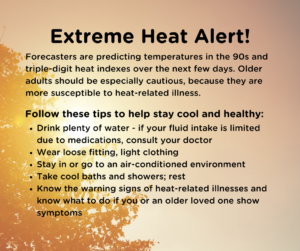 Perhaps more than any other group, older adults should pay special attention to heat waves and heat emergency warnings. More than younger people, older adults are susceptible to heat-related illnesses and injuries, because:
Perhaps more than any other group, older adults should pay special attention to heat waves and heat emergency warnings. More than younger people, older adults are susceptible to heat-related illnesses and injuries, because:
- They tend not to adjust as well to sudden changes in temperature.
- They are more likely to have a medical condition that upsets body responses to heat.
- They are more likely to take medicines that impair the body’s ability to regulate its temperature or that inhibit perspiration.
If you are concerned about older relatives or neighbors who may be at risk during a heat emergency, here are some tips:
- Visit at least twice a day and watch for signs of heat exhaustion or heat stroke.
- If they have air conditioning, make sure they use it, at least during the heat emergency. If not, take them to an air-conditioned location if they lack transportation or make sure they are using fans and keeping windows open. If they insist on keeping windows shut for safety reasons, you may need to move them to another location during the heat emergency. Click here for a list of local cooling centers in Council on Aging’s resource directory.
- If the person’s doctor normally limits fluids or has a patient on diuretics, check with the doctor’s office about fluid intake during very hot weather. Otherwise, make sure they are drinking enough water.
Older adults should also follow these prevention tips to protect themselves from heat-related stress:
- Drink cool, nonalcoholic beverages. (If your doctor generally limits the amount of fluid you drink or has you on water pills, ask him how much you should drink when the weather is hot. Also, avoid extremely cold liquids because they can cause cramps.)
- Rest.
- Take a cool shower, bath, or sponge bath.
- If possible, seek an air-conditioned environment. (If you don’t have air conditioning, consider visiting an air-conditioned shopping mall or public library to cool off.)
- Visit a local cooling center. Get a list of Cooling Centers in COA’s Resource Directory
- Wear lightweight clothing.
- If possible, remain indoors in the heat of the day.
- Do not engage in strenuous activities.
Additional heat safety resources for older adults
Get help with high utility costs
Information about financial assistance programs and tips for summer cooling from Duke Energy
Learn about the Hamilton County Senior Utility Assistance Program
